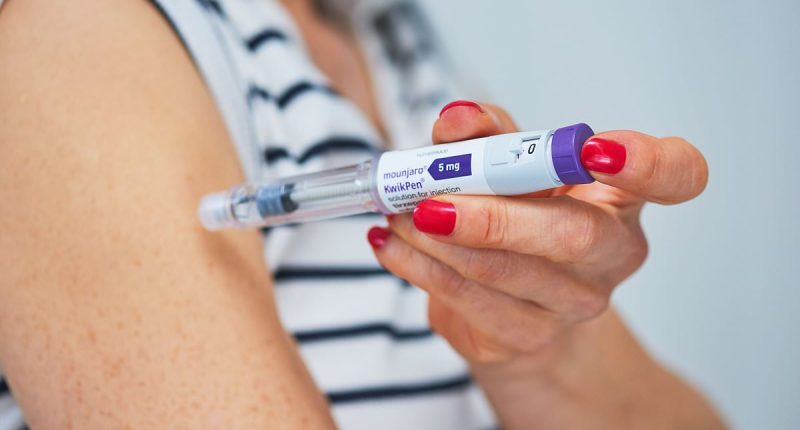Share this @internewscast.com
A doctor has warned those who use weight loss jabs like Ozempic, Wegovy and Mounjaro to expect a disturbing change to their appearence: sudden hair loss.
According to Dr Roshan Vara, hair transplant surgeon and co-founder of Treatment Rooms London, many patients struggle with this upsetting side effect and seek remedies.
But, he told MailOnline, the unfortunate side effect is not directly caused by the medicine in the injections.
It’s most likely due to the dramatic change in nutrient intake, which can trigger deficiencies in vital vitamins and minerals needed to help hair follicles flourish.
‘Products like Mounjaro or Wegovy can mean patients are unintentionally placed under a calorie restriction,’ explained Dr Vara.
‘This restriction causes your skin and hair to suffer as the body prioritises essential functions, diverting nutrients away from your hair and into internal organs.’
Dr Vara’s warning comes amid a swathe of skinny jab users taking to social media forums such as Reddit to share their concerns about hair loss.
Some have written that they are so disturbed by the side effect, they’ve stopped taking injections, known as GLP-1 agonists, altogether.

Mounjaro has changed the lives of millions of people… and left others worried they’re balding
But Dr Vara said the good news is that this type of hair loss, known medically as telogen effluvium, is a temporary condition.
When normal calorie consumption is resumed, the hair regrows, he said.
Dr Vara urged weight loss jabbers to pay close attention to what they’re eating and drinking, even if they have a much reduced appetite and fewer cravings than usual.
He said: ‘A balanced and nutritional calorie intake is a big part of this, as well as monitoring stress and hormonal changes.
‘If patients are still reporting hair loss despite this balance, they should consult a hair loss specialist, to explore what else could be triggering this.’
The warning comes as ‘King Kong’ weight loss jab Mounjaro, also known as tirzepatide, will be offered to around 220,000 people over the next three years under new NHS prescribing rules.
Previously the potent drug, which helps patients shed up to a fifth of their body weight in a year, was available privately and at a small number of specialist NHS weight loss clinics.
GPs can now prescribe the drug to patients with a BMI over 40—classed as severely obese—and at least four obesity-related health conditions, such as type 2 diabetes, high blood pressure or sleep apnoea.
Mounjaro is a GLP-1 injection, which mimics the effect of a hunger hormone that is released by the stomach in response to eating and tells the brain when it is full.
In 2021, Wegovy—which contains the drug semaglutide, also found in Ozempic—became the first GLP-1 injection to be approved for use in the UK.
Studies suggest that around 1.5million people in the UK are using GLP-1 jabs to lose weight.
However, as the popularity of the injections has risen, so too has concern about a number of little-known ill-effects.
These include including nausea, vomiting, diarrhoea, bone fractures, tooth damage, severe anxiety and depression, as well as more serious conditions like organ damage.
Last month, it was reported that more than 100 British deaths have been linked to weight loss jabs.
None of the fatalities, which have all been reported since the jabs were licensed for use in the UK, are proven to have been caused directly by the drugs.
However, health chiefs tasked with policing the safety of medicines admit reports of side effects indicate ‘a suspicion’ they may have been to blame.
In November last year, news broke of the death of Scottish nurse Susan McGowan, 58, who experienced multiple organ failure, septic shock and pancreatitis after taking just two doses of Mounjaro.
Hers is the only confirmed fatality linked to the jabs in the UK.
While scientists aren’t completely clear on the reasons why GLP-1 drugs can trigger deadly pancreatitis, experts have suggested the medication may ‘overstimulate’ cells in the organ.
Medications like Mounjaro interact with the pancreas by enhancing insulin release, helping to stabilise blood sugars.
However, this could cause put excess strain on the organ, causing it to become severely inflammed.












